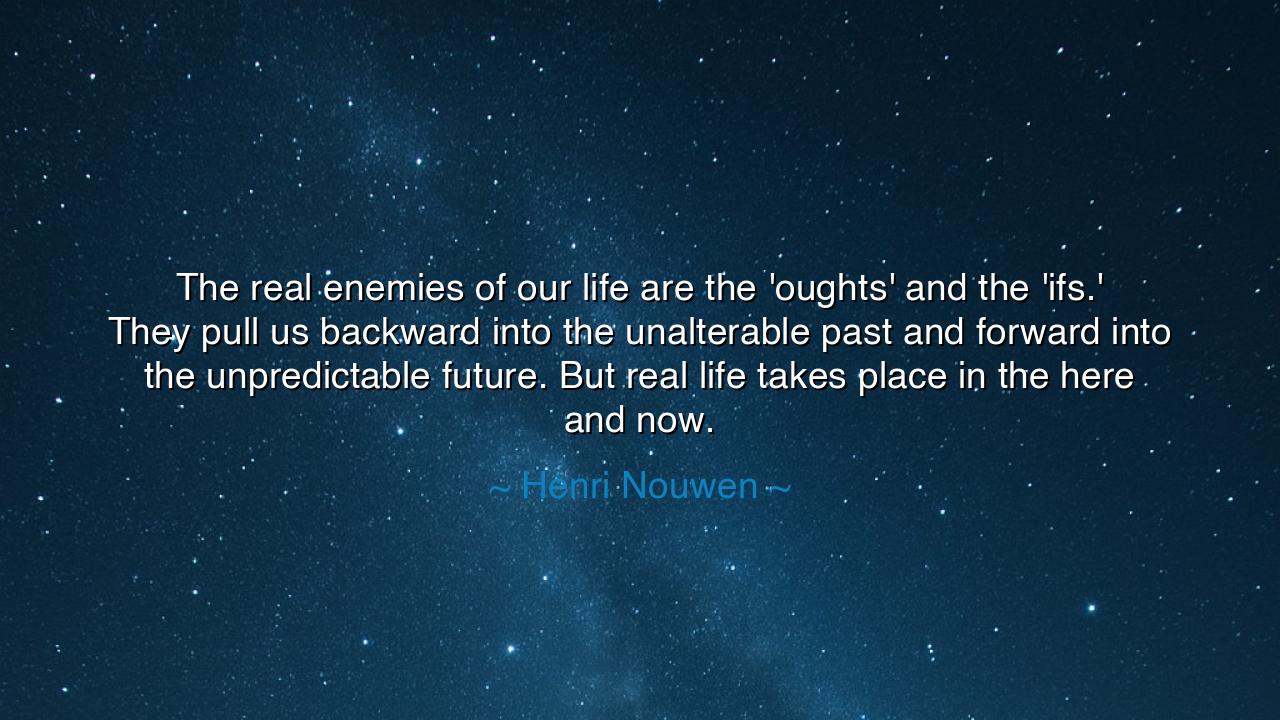
The real enemies of our life are the 'oughts' and the 'ifs.' They
The real enemies of our life are the 'oughts' and the 'ifs.' They pull us backward into the unalterable past and forward into the unpredictable future. But real life takes place in the here and now.






“The real enemies of our life are the ‘oughts’ and the ‘ifs.’ They pull us backward into the unalterable past and forward into the unpredictable future. But real life takes place in the here and now.”
— Henri Nouwen
In these wise and tender words, Henri Nouwen, the priest, writer, and contemplative teacher of the heart, gives voice to a truth that the restless soul of humanity has long forgotten: that life itself dwells only in the present moment. His warning is simple yet profound: our greatest enemies are not men or misfortune, but the “oughts”—the chains of regret that bind us to the past—and the “ifs”—the shadows of fear that drag us into a future that does not yet exist. The origin of this quote lies in Nouwen’s reflections as a spiritual guide and psychologist, one who had seen both the ache of longing and the torment of guilt in those who sought meaning. He understood that the mind, left untamed, wanders endlessly between what was and what might be, while the soul withers in the silence of the present.
When Nouwen speaks of the ‘oughts’, he speaks of the burden of what we think we should have done, who we should have been, the mistakes that we cannot undo. These “oughts” are ghosts that dwell in memory, whispering of failure and demanding correction where none is possible. To live in their company is to dwell among the dead—to spend one’s strength trying to rewrite what has already been carved in stone. Likewise, the ‘ifs’ are sirens of the unknown, luring the mind toward future shores that may never exist: “If only this happens, then I will be happy.” “If I fail tomorrow, I will be ruined.” Thus, the spirit is torn in two directions—backward by remorse and forward by fear—and in that tearing, the present moment, the one place where real life unfolds, is lost.
Nouwen’s insight is not new, but ancient as breath itself. The Buddha taught that suffering arises from attachment to what was and craving for what might be, while the Stoics urged the mastery of the present, teaching that a man’s peace lies in accepting what is within his power now. The philosopher Marcus Aurelius, emperor and sage, wrote in his Meditations, “Confine yourself to the present.” He, too, understood that the mind’s wandering between past and future was the thief of peace. But Nouwen, speaking not as emperor or ascetic, but as one who had loved, doubted, and suffered, gave this wisdom a voice both gentle and human. For him, to live in the present was not mere philosophy—it was spiritual survival.
Consider the story of Leo Tolstoy, who, at the height of fame, was seized by despair. He had wealth, family, renown—yet he felt empty, consumed by the “oughts” and “ifs” of existence. He wrote, “My life came to a standstill. I could not breathe.” But when he turned his gaze to the simplicity of the moment—the peasant sowing seed, the child laughing, the warmth of sunlight—he rediscovered the miracle of the ordinary. It was in the here and now, in the small acts of being, that life regained its meaning. The philosopher’s insight and the mystic’s vision met in this same truth: that peace is found not in changing the past or mastering the future, but in dwelling wholly in the present moment.
Yet Nouwen does not speak merely to philosophers or saints—he speaks to every heart that has ever whispered, “I wish I had…” or “I hope someday…” His message is both a comfort and a challenge. It is not easy to live in the present. The mind resists stillness; it prefers the safety of imagining. To be fully present is to face reality in its rawness—to feel pain without fleeing, to embrace joy without clinging. But this is the essence of living. The ‘oughts’ and ‘ifs’ are illusions, drawing us away from the sacred immediacy of life. To let them go is to awaken—to see the beauty of a single breath, a single touch, a single heartbeat.
The lesson, then, is clear: life exists only where you are. Not yesterday, not tomorrow, but now. To live otherwise is to chase shadows. So when the past torments you with its regrets, answer it gently: “You have no power over me.” And when the future seduces you with its promises or fears, remind it: “You do not yet exist.” Return instead to the present moment—the steady rhythm of your breathing, the feeling of the earth beneath your feet, the presence of another soul beside you. These are the foundations of reality; in them lies both peace and purpose.
So, my listener, take this teaching as a compass for your days. Do not live in the ruins of yesterday, nor the fantasies of tomorrow. The past is the teacher, not the home; the future, the horizon, not the dwelling. Walk instead in the sunlight of the present moment, where love can be given, forgiveness received, and joy born anew. For as Henri Nouwen so beautifully reminds us, real life takes place in the here and now—and it is here, in this breath, in this heartbeat, that eternity itself begins.






AAdministratorAdministrator
Welcome, honored guests. Please leave a comment, we will respond soon